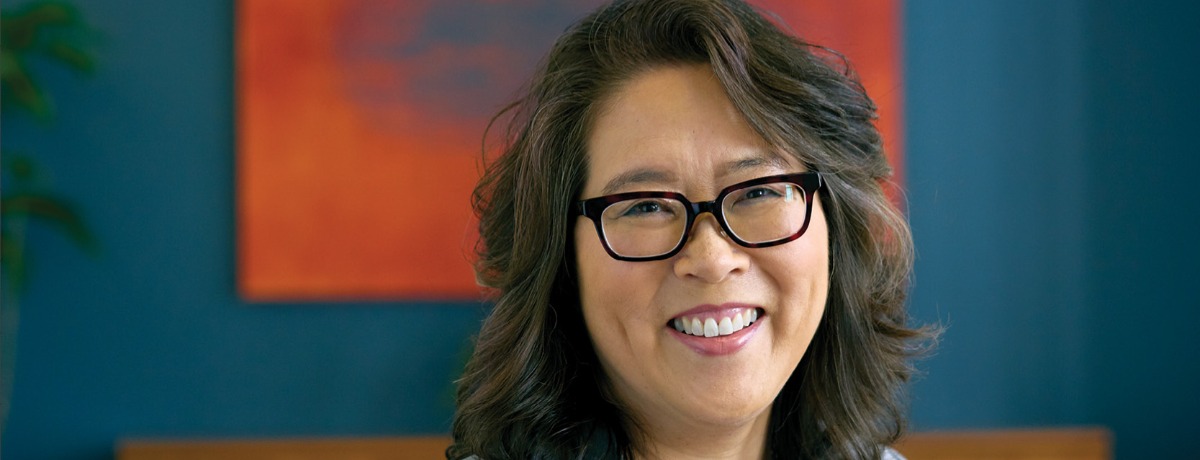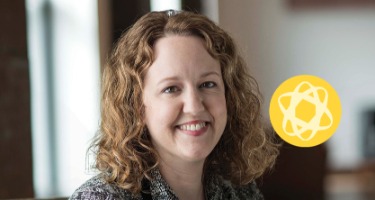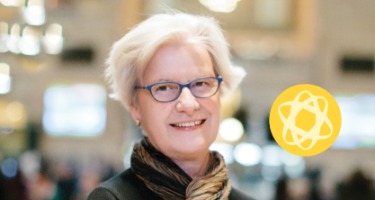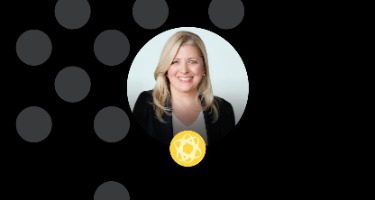You could say Rosemary Fei embarked on her legal career with some reluctance. After obtaining an undergraduate business degree, she applied on a whim, as she tells it, to a single law program and was accepted. For all Fei’s humility explaining how she got into the profession, some gloating would nonetheless be warranted: That one program to which she was accepted was Harvard Law School. After graduation, Fei joined Michael Dukakis’s 1988 presidential campaign as its federal election law compliance officer and deputy budget director. Following Dukakis’s defeat, she spent two years at a general business law firm as a transactional attorney because the managing partner told her that she wasn’t aggressive enough to be a successful litigator.
Fei might have quit law entirely after that episode, she says, had she not serendipitously stumbled upon an opportunity with a boutique three-person law firm in San Francisco, Silk Adler & Colvin. Fei admits she walked into the lunch interview thinking, “I don’t want to be a lawyer anymore,” but walked out as the firm’s first official associate hire. Twenty-seven years later, Fei is a principal with the firm—now known as Adler & Colvin—serves on the board of directors of CalNonprofits, and is vice-chair of the Law Developments of the Exempt Organizations Committee of the Tax Section of the American Bar Association. Having devoted her life’s work to nonprofit law, Fei exhibits gratitude and admiration for a specialty she continues to find enriching, meaningful, and uniquely nurturing to women and minorities.
What drew you to nonprofit law—and what kept you there?
Clients view business lawyers as a transaction cost, and there’s often no sense of accomplishing something for them, let alone helping the world, making the world a better place, or leaving it better than when you arrived. For me, at least, that sense of working toward something larger wasn’t part of that practice.
What I found practically the first week I walked into this practice of nonprofit law, where I had a lot to learn, was that the clients were passionate about various ways in which they felt they could make the world better. I found this so much more fulfilling. I love that I can feel like I’m helping [clients] and they actually see it as help rather than a burden or a transaction cost. Some of them do see it as a burden, of course, and we’re not cheap, so that’s always an issue for a nonprofit—but it’s really been rewarding to feel like I could help in all these amazing efforts in so many different fields of human endeavor.
Can you give us an overlay of the world in which you work, the types of clients, and the kinds of policies you navigate?
It’s a little hard to categorize because nonprofits come in all shapes and sizes, and we pretty much have all of them. I represent everything from multibillion-dollar foundations to little startups. I represent environmental groups, arts groups—it’s really hard to give you a sense of the breadth. What we provide is tax-exempt-status advice and counsel, which can include structuring and transactional work, and ongoing compliance, sometimes representation before the IRS or the attorney general in audits. We also do charitable trust law and nonprofit corporate law, which involves advising on corporate governance and best practices.
Within that umbrella, I’ve developed personally an emphasis on the political restrictions and activities of nonprofits including PACs and social-welfare organizations, which I think have gotten a terrible name due to recent highly publicized abuses. Charities as well: advising on their ability to lobby and the limits on their lobbying, or what they can and can’t do in an election year. In addition to that, I do a fair amount of advising of religious organizations, which present some really interesting First Amendment issues and are regulated differently than the rest of the nonprofit sector. Lastly, I do a lot of governance. Ongoing advice, governance structuring, member rights, board disputes, membership disputes, that kind of thing.
So it’s a lot of fun. I am so blessed to have found this practice, because I’m quite convinced I would not be a lawyer if I had not found it.
What challenges do you face when a new presidential administration comes in? Presumably there’s a changing of the guard in policy, regulations, and political climate—does that shape or affect the work you do?
The Trump administration has been, unfortunately, one of those full-employment acts for my kind of law, particularly here in San Francisco, although we have clients all across the country, and even internationally. A lot of our clients’ initial reaction was to feel threatened and concerned on behalf of themselves, but also on behalf of their constituencies. Unfortunately, a good deal of that has come to fruition, and they are trying to engage in every way possible to minimize the damage. One of the silver linings is that being attacked can be a fundraising boon. Another thing we’ve seen is that it has prompted more of the sector to think a lot harder about how to exercise their voice in public policy, and how they can engage without violating their tax-exempt status—in elections, rule-making, civic engagement, and even protests. I don’t think it’s been the same as with other administration transitions. With every new administration there are questions that typically come up about influencing government, but there’s been a huge amount [since the election] because of fears about the Trump administration.
Have any big industry cases or other issues this year caused big changes in your field?
There are so many ways I could answer that. The entire sector is wrestling with the fallout from the new tax law and how that’s going to affect it in terms of charitable giving. There were also a lot of very specific provisions in that law that affected subsectors, and for the most part, I think the changes seem to indicate a suspicion of the nonprofit sector, which for such a long time has [been so] trusted by the public. I worry about that a lot.
I also think that the limited funding of the IRS and some of the limits put on the IRS’s ability to properly regulate the sector are really going to damage [nonprofits] in the long run. Right now, for example, the process for getting an exemption for your organization amounts to more of a registration process than a real application with a real review. There’s a lot of evidence that that is resulting in a lot of organizations being recognized that don’t qualify. For some of them that’s just inadvertent—they don’t understand the rules, but they managed to get a 501(c)(3) letter from the IRS—but I think there’s also a huge opportunity for abuse. As those things come to light over the next dozen years, I worry that it’s going to hurt the sector and its reputation, and the trust the public generally [has] in their social institutions, for a very long time.
Are there any changes to your area of law that you hope to see in the next five to 10 years, or any shifts in public perception?
I think there are misperceptions about the people in the nonprofit sector. A lot of [nonprofits] can be very small organizations with no paid staff, and the complexity of the law can be really hard for them. It’s important for regulators at the state and federal level to sort the wheat from the chaff and distinguish people who are innocently making errors—but errors that need to be fixed—from people who are taking advantage of the system. This sector is so important and, frankly, so undervalued. But I also feel like it needs a strong regulatory framework. It needs real enforcement against people who are abusing it, but also a gentle hand and some understanding when people who have only the best of intentions screw up. I don’t see the bad actors so much as I see that group, the people with good intentions who screw up. It can be so hard and so expensive to fix things, for example, if they just didn’t know that there were filings to do for years, and they lose their exemption.
Can you speak to any of the unique challenges women face in the legal industry?
You know, I’m not only female, but I’m also a member of an ethnic racial minority; I’m Chinese-American. It’s been interesting because there are times when my white male colleagues have found that because this sector is diverse—and the progressive side of the sector is very interested in promoting diversity, including in their legal counsel—being a member of a minority, and being a woman, has actually been a business-development plus. Not all the time, but on balance I think it has been a plus, and I don’t know if you can say that in any other field. So wow, how lucky am I that I stumbled on that? On the other hand, of course there are still folks around who are more likely to listen to, to put it baldly, an older white guy. I don’t take offense at that, honestly. There have been occasions where there’s been a board meeting, and they needed a training, and I looked at the board list and realized that everyone on the list was older, white, and male. I said to them, “Look, would you like me to get one of my other partners who might be easier for these folks to learn from, to come and do the presentation?” To their credit, the particular client I’m thinking of thought about it and said, “No, we’d like you to do it.”
But it certainly has been the case other times when we’ve said, “You know, our job is to get the client to understand our advice,” or maybe we’re giving them a training, so they need to understand the legal framework, and if they’re going to get that better from someone other than me, they should get it from someone other than me within my firm, you know? So either way, it’s great: We have a very collegial atmosphere, and I really appreciate that I have not faced the kinds of obstacles that I think women generally face in the legal field.
What advice do you have for women just embarking on their career in law?
I would say you probably still need to have a pretty thick skin, and try not to be too sensitive. While you want to stand up for yourself, you want to pick your battles, and I try to be tolerant without letting people . . . I try to hold people accountable for acting respectfully and all that. I don’t mean to sound like I’m in any way saying anyone should put up with sexual harassment, but I think there can be things that fall short of that kind of malevolent, venally motivated activity. That’s more of an educational challenge. If you’re a woman, if you’re a minority, I know there are people who want to say, “Look, it’s not my job to help you understand what it’s like to be X, Y, or Z.” But I feel we all have an obligation to try to help those around us who don’t understand, understand. And it’s also OK to take the route I’ve taken, which is to mostly get away from it. I mean, I did deal with race and gender discrimination much earlier in my career; I just haven’t had to deal with it in a long time in any serious way.
Do you think that’s the result of a general change of the times, or the fact that you’ve focused your professional development on a welcoming field?
I think in part it’s the sector I serve, as I said. That’s a lot of it. I also have seen colleagues of mine, often women, whom I respect deeply, who don’t get the respect within their large law firms because their nonprofit client base is perceived as being less valuable.
Why do you think that is?
There’s a huge emphasis on profit, and if something’s called “nonprofit,” there’s a perception that it’s just . . . [Adler & Colvin founding partner] Tom Silk had the vision to realize that this could be a paying practice. I don’t get it as much anymore, but I used to, when I told people what I did, they would say, “Can you do that and even make a living?” The answer is yes. And now I don’t get that question as much.





























